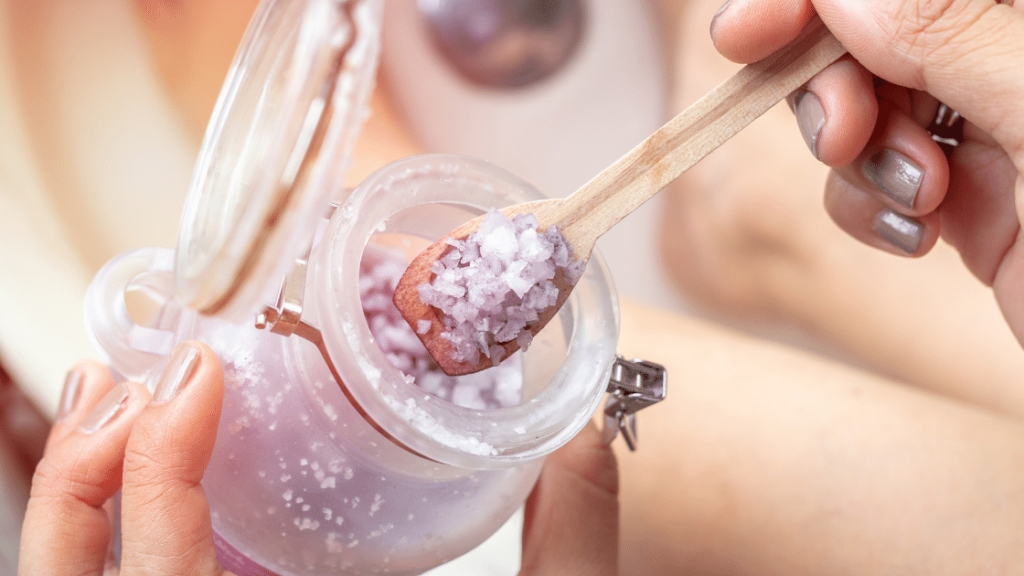Do Epsom Salts Work?

What’s up with epsom salts? Some people swear by their benefits while others are skeptical. Floating in a fizzy bath sounds pretty relaxing, but does the fizziness really have an impact on the relaxing aspects of baths? They’re already relaxing, with or without salt fizzles!
But you’re still curious about the growing popularity of epsom salts. If they really do add some extra soothe to an already soothing activity, is there anything else they can do? Read on and you’ll find out!
How do epsom salts work?
Mineral absorption is the answer!
Epsom salt is quite different from the table salt in your kitchen. It’s a compound made of magnesium, sulfus, and oxygen. Really, epsom salt is just a nickname for magnesium sulfate.
You know how most of us are deficient in just about every mineral ever? Magnesium deficiency is very common. Research suggests that magnesium can be absorbed by the skin. So what’s the harm in trying it out? You can soak in it, scrub with it, or make a mask out of it. But if topical treatment isn’t your thing, you can dilute it in water and drink it up! Mind you, it doesn’t taste good. But it’s really affordable! You can find an 8-pound bag for four dollars just about anywhere.
So the skin absorbs the magnesium from the epsom salts, but what exactly does that absorption do for your body?
Pain Relief
We hear about this one a lot. Athletes are often encouraged to soak in epsom salts after a long day of strenuous practice. The relief will have them pumped for the upcoming game!
Magnesium, which is necessary for proper muscular and joint function, reduces inflammation in the muscles and bones. Increasing magnesium intake leads to chemical reactions that relieve tight and sore muscles.
Now let’s talk about the bones. Magnesium is naturally found in every part of your body; every single cell. And 60% of it is found in bone — woah! So when magnesium levels fall below ideal, the bones take a big hit. Prolonged magnesium deficiency can lead to weak bones and joints. For this reason, those at risk for arthritis should really be on top of their magnesium intake, and epsom salt treatments can offer a boost — but it’s still a good idea to eat magnesium rich foods like almonds and spinach.
Stress Reduction
Magnesium plays a big role in brain health and mood regulation. Did you know that magnesium deficiency can increase the risk for depression? When the brain has low levels of magnesium, serotonin levels decrease. Serotonin is what keeps the body in a calm and content state, and a brain that can’t produce adequate levels will be stressed out.
A healthy dose of magnesium also lowers your blood pressure, which in turn leads to a calmer body. Are you seeing why epsom salt treatments are often used in the spa environment?
Skin Improvement
Have you ever gone for a swim in the ocean? If so, do you recall how soft your skin was after drying off? Those ocean waves just sloughed away your dead skin, giving you a full body microdermabrasion. It’s all that saltwater going to town on the skin impurities!
An epsom salt bath can work similarly, but without all the crashing waves. Salt water, either straight from the ocean or created in a tub, delivers magnesium to the skin. Another benefit of this special mineral is moisture retention in the skin.
If you want to make your own exfoliation cream, just mix epsom salts with your favorite carrier oil (almond oil is a good choice!) and apply to the area of your skin that needs it most. Add some essential oils too, if you’d like! The video below shows you how to do it!
Things to Consider
Whether it’s for pain relief, emotional release, or a beauty regimen, epsom salt treatments are safe for most people.
That being said, too much of anything can be harmful for the body. While rare and extremely difficult to do, a person can overdose on any given mineral. If you have any concerns about your magnesium intake, be sure to consult a health professional. Contact your local poison center if you experience nausea, dry mouth, shallow breathing, lethargy, physical pain, or flushed skin after applying or ingesting epsom salts.

Katrina Jenkins
Author, Licensed Massage Therapist
Katrina Jenkins graduated from Towson University in 2013 with a Bachelor’s Degree in Health Science and worked as a nurse’s aide briefly before pursuing her true passion. She graduated from the Massage Therapy Institute of Colorado in April 2016 with honors and completed the Touch of Healers Scholarship Program the following summer. She has been a part of the Moyer Total Wellness Team since the summer of 2017.
Resources
Gröber, Uwe et al. “Myth or Reality-Transdermal Magnesium?.” Nutrients vol. 9,8 813. 28 Jul. 2017, doi:10.3390/nu9080813, https://www.ncbi.nlm.nih.gov/pmc/articles/PMC5579607/.
Jahnen-Dechent, Wilhelm, and Markus Ketteler. “Magnesium basics.” Clinical kidney journal vol. 5,Suppl 1 (2012): i3-i14. doi:10.1093/ndtplus/sfr163, https://www.ncbi.nlm.nih.gov/pmc/articles/PMC4455825/.
Eby, George A., et al. “Magnesium and Major Depression.” Magnesium in the Central Nervous System [Internet]., University of Adelaide Press, Jan. 2011, www.ncbi.nlm.nih.gov/books/NBK507265/.
Gröber, Uwe, et al. “Calcium Carbonate with Magnesium Overdose.” Mount Sinai Health System, 28 July 2017, www.mountsinai.org/health-library/poison/calcium-carbonate-with-magnesium-overdose.
Photo Credit
Canva by Techa Tungateja
